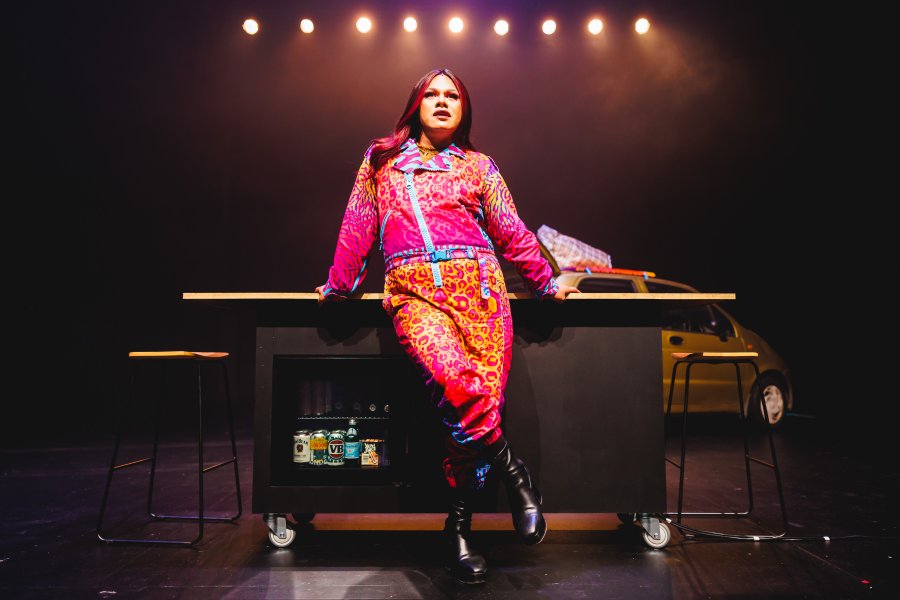By Darby Turnbull
I often find the rating system limiting; yes it’s a readily accessible and shorthand way of indicating whether a performance is worth seeing or not based on the individual tastes and points of reference of the reviewer. But its most glaring inhibition comes when a performance is so raw, so personal, so essential that to rate it like you would the quality of mince, feels transgressive, and counter intuitive to the power of the experience.
Burgerz by Travis Alabanza and currently being embodied by Kikki Temple at Theatreworks is a searing exploration at the ways in which BIPOC trans and gender non-conforming people exist in public spaces. The inciting incident being a burger hurled at them accompanied by a transphobic slur and the inaction of those that witnessed it. Burgerz was originally written and performed by Alabanza in the UK in 2019 and has been reappropriated for Kikki Temple this side of the pond. Alabanza is having a very good week, their play Sounds of the Underground opened at the Royal Court in London as well.
The violence and dark absurdity of the act is deconstructed as part cooking show, part confessional, part audience interaction. The act of making the burger, trying to understand the societal constructs that led to it being thrown with the intention of causing humiliation and harm.
The semantics aren’t especially relevant; whether Temple and Alabanza were both literally hit with a burger is beside the point they share the experience of the harm that is inflicted on trans bodies as a matter of course, that’s sadly quite universal. The nuances and specific incidents cited within the script all felt painfully familiar.
Kitan Petkovski’s production attractively and brilliantly utilises the Theatreworks space to create a fun, anarchic and unpredictable space for the audience to integrate themselves and for Temple to let loose. Katie Sfetkidis’ lighting uses a fabulous array of colours and tones to evoke the epic emotions inspired by the text. Rachel Lewindon’s soundscape provides a haunting, lilting accompaniment with use of breathe work and the occasional pop banger to lift the mood.
Temple is a force of nature and looks stunning in Bethany J Fellow’s costume designs; two clever, contrasting jumpsuits. Temple is a beloved and deeply respected member of Naarm’s queer community and indie performance scene and the audiences love for her is palpable from her star’s entrance (I won’t spoil it here but it’s a masterstroke) to the thunderous ovation that lasted for many, many minutes, she owns the space and those that are lucky enough to share it with her.
Part of the incredible act she pulls off doing this piece is that essentially becomes a deconstruction of the ways in which she, and people her share the experiences of trans misogyny and racism, exist and interact with the public.
The text deliberately calls out the rueful absurdity of having to put on a show to have people pay attention to the ways in which her personhood is compromised by the mere act of getting a train or walking down the street. She displays how her strengths as a performer also may be essential to her everyday life; quick timing, to control a situation by being witty, sassy, saucy, salacious, fierce, fabulous; these attributes are hard won and essential tools in the arsenal of navigating hostile spaces. We may applaud her, we may snap our fingers, we may giddily lap up proximity to someone who shines so bright but do we hold space for her anger, despair, doubts, righteous indignation; if you’re paying attention you know all too well how femme people, especially those who don’t have the shield of whiteness are shut down when they get angry and start telling some harsh truths.
The text is daring and provocative in the ways in which it involves the audience in the performance. It specifically calls for the inclusion of a white cis man and white cis woman to engage with Temple in real time as she swaps playful banter whilst prepping a burger live on stage (there’s a working cooker) whilst engaging with their own privilege and demands to sit with discomfort regarding race and gender. At this performance a man who engaged thoughtfully and gently and woman who looked like she was going to combust when confronted with what she was being asked to do, though does corroborate. Temple navigates their individual energies with charm, ease and real empathy and it would be fascinating to witness how these interactions change at each performance and how they respond to the challenge offered. The balancing act, which as far as my own response is concerned succeeds, is how the responses of the trans/queer audiences and the cis audiences differ with this work. This doesn’t feel just like a trauma exhibition for cis people even though it is undoubtedly a demand for recognition but it’s also something every trans person will have some level of familiarity with (I did) and could on some level be cathartic, validating or mournful where social mobility is still linked to the ability to pass as cis or proximity to social privilege. Whilst the rich, famous and powerful may publically dabble in or identify with gender non conformity are all perfectly nice but what they have that many of us don’t is the funds and access to private cars, drivers and personal security and that makes all the difference.
It’s Kikki Temple’s passionate and painful testimony that will linger the longest I believe; the sheer act of putting herself through it every performance is a startling act of intimacy between her and the audience. It’s the ultimate tough love; the outpouring of emotion comes at a cost and she doesn’t allow us to forget. Through the seamless collaboration of her and Alabanza, they both clearly indicate that given their unique experiences they are more than usually apt observers of human behaviour; there are many sharp indications that they see right through us and that deflection through adulation is cheap if direct action and solidarity isn’t taken. There are many people who laud their own progressiveness but froth at the mouth when asked to acknowledge the validity of trans people’s lived experiences, often citing that they’re going ‘too far’. As Alabanza succinctly puts it (and I’m paraphrasing), why is breathing up for debate?
Image: Daniel Rabin





